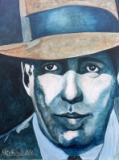Boxers
Boxing great Henry Armstrong hammered away at discrimination in the 1930s and 1940s by refusing to fight in segregated arenas.

Andrew "Rube" Foster organized the Negro National League, the first long lasting black baseball league in the United States, which operated from 1920 to 1931. A player, coach and manager, Foster was inducted into the Baseball Hall of Fame in 1981. Foster, considered by historians to have been perhaps the best African-American pitcher of the 1900s, also founded and managed the Chicago American Giants, one of the most successful black baseball teams of the pre-integration era.
Andrew Foster was born in Calvert, Texas on September 17, 1879. His father, also named Andrew, was a reverend and elder of the local American Methodist Episcopal Church. Foster grew to be a large man, standing almost six foot-three inches, and weighing over 200 pounds. In 1897 Rube Foster began his professional baseball career with the Waco Yellow Jackets, an independent black team. Rube Foster's size provided him with a great fastball, but he was equally feared for his outstanding screwball. Both black and white fans enjoyed watching Rube Foster pitch and in 1902 he was signed with the top ranked Chicago Union Giants by Frank Leland. His rookie year for the Giants was a good one and Foster won over 50 games for his team that year.
Foster earned the nickname "Rube" by outpitching white star Rube Wadell in a 1902 exhibition game. Now he was becoming known as black baseball's first great impresario. In 1903 Foster was the top black pitcher in the country. He pitched the Cuban X-Giants to the black championship, and was the winner in four of their five victories over the Philadelphia Giants in the Black World Series. The following year, he pitched the Philadelphia Giants to the title, and recorded both victories in a best-of-three series against the Cuban X-Giants.
Most of Rube Fosters records are hard to verify. The Black teams were traveling teams at the time and would pretty much play anyone, anytime they could get a game. One thing that can't be disputed is the fact that everyone respected and admired Rube Foster and most claimed he was the smartest pitcher they faced.
Foster began managing in 1907, when he guided the Chicago Leland Giants to a 110-10 record. Their record was 64-21-1 in 1908. In 1909 Foster challenged the Chicago Cubs to a series, which the Cubs won in three close games. Foster pitched the second game and took a 5-2 lead into the ninth inning, but lost 6-5. Mordecai Brown won the first and third contests. There is no record of any major league club coming forth to answer Foster's challenge in 1910, when his team went 123-6.
In 1920, Foster, Taylor, and the owners of six other Midwestern clubs met in the spring to form a professional baseball circuit for African-American teams. Foster, as president, controlled league operations, while remaining owner and manager of the American Giants. He was periodically accused of favoring his own team, especially in matters of scheduling and personnel. Rube Foster seemed able to acquire whatever talent he needed from other clubs, such as Jimmie Lyons, the Detroit Stars' best player in 1920, who was transferred to the American Giants for 1921, or Foster's own younger brother, Bill, who joined the American Giants unwillingly when Rube forced the Memphis Red Sox to give him up in 1926.
His critics believed he had organized the league primarily for purposes of booking games for the American Giants. With a stable schedule and reasonably solvent opponents, Foster was able to improve receipts at the gate. It is also true that when opposing clubs lost money, he was known to help them meet payroll, sometimes out of his own pocket.
Rube Foster's American Giants won the new league's first three pennants, before being overtaken by the Kansas City Monarchs in 1923. In the same year the Hilldale Club and Bacharach Giants, the most important eastern clubs, pulled out of an agreement with the NNL and founded their own league, the Eastern Colored League (ECL). The ECL raided the older circuit for players, Foster's own ace pitcher Dave Brown among them. Eventually the two leagues reached an agreement to respect one another's contracts, and to play a world series.
The first Negro World Series, played between the two leagues, was in 1924 between the Kansas City Monarchs of the National League, and the Philadelphia Hilldales representing the Eastern League. The Monarchs won the series in ten games. The star pitcher of the Series was a black Cuban named Jose Melendez, whom the Major League's John McGraw had said he would gladly pay $50,000 for Melendez's services, if only he were white.
In 1926 Rube Foster suffered a nervous breakdown and was committed to an insane asylum. His beloved league collapsed in 1930, partly due to the Great Depression, but mainly from the loss of its leader. In 1981, Foster was elected to the National Baseball Hall of Fame. He was the first representative of the Negro leagues elected as a pioneer or executive. On December 30, 2009, the U.S. Postal Service announced that it plans to issue a pair of postage stamps in June honoring the Negro leagues baseball, and featuring Foster on one of the stamps.
Don't miss a single page. Find everything you need on our complete sitemap directory.
Listen or read the top speeches from African Americans. Read more
Read about the great African Americans who fought in wars. Read more
African Americans invented many of the things we use today. Read more
Thin jazz, think art, think of great actors and find them here. Read more
Follow the history of Black Americans from slave ships to the presidency. Read more
Olympic winners, MVPS of every sport, and people who broke the color barrier. Read more
These men and women risked and sometimes lost their life to fight for the cause. Read more
Meet the people who worked to change the system from the inside. Read more

Visit my RedBubble page and use Michael Arnold Art to create greeting cards, T-shirts, mugs, and more.

The variety and impressive numbers of mammals, birds and marine wildlife in Alaska draw visitors from all over the world. For some travelers, Alaska is wilderness, at least compared to what they may know from back home. The pristine wilderness of Alaska is, perhaps, the last vestige of thriving populations of North American wildlife. Where else can you see polar bears, bald eagles, blue and humpbacked whales, gray wolves, grizzly bears, orcas, lynx, moose, and hundreds of other rare and endangered species in their original and undisturbed natural habitats?

Enjoy our website filled with original signed acrylic paintings by award winning Artist Michael Arnold. Located in Citrus County Florida, Michael Arnold is a the editor at the Citrus County Chronicle. When he's not busy being an editor, he is an avid artist who enjoys painting in a variety of styles. We hope you take the time to click on each image to see a larger view and to learn what the artist, Michael Arnold has to say about his paintings.

As dog owners and people who care deeply for animals and wildlife, we wanted our Dog Encyclopedia to be a website that could empower pet owners to create the most positive, loving environment for their dogs. Dog Encyclopedia realizes that owning a dog is like adding a new member to your family.

Floridian Nature has everything your are looking for in Florida nature. The wildlife of Florida is rich and varied, yet most of us are familiar with only a dozen or so species: the "well known endangered species such as manatees and panthers; those, like raccoons and squirrels, that have adapted to urban environments; the frightening alligators and black bears; and those like the armadillo who can't seem to cross the road. Yet they are just a few of the many animal species found in Florida.
